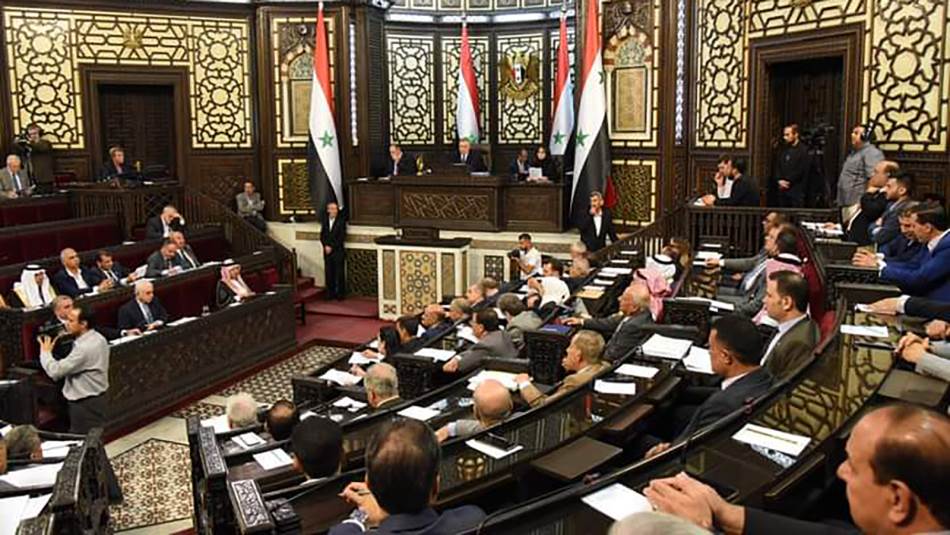The recent People’s Assembly elections, heralded by the regime as marking a new era, have concluded. Notably absent from this session are several figures previously associated with controversial economic activities in their respective regions: Amer Tayseer Khiti, known for involvement in the drug trade in the countryside of Damascus; Hussam Qaterji, recognized for his role in the oil trade in Aleppo; and Fouad Aldani, leader of the Tigers Forces militia and infamous for fuel smuggling in Aleppo, who had his immunity lifted last year. Businessman Mohamed Hamsho, close to Iran, was also compelled to withdraw from last year’s electoral race. In contrast, new members with foreign affiliations have entered the Council.
According to the election results, there has been turnover in the People’s Assembly, with over 62 percent of the Assembly seeing change. This turnover includes 94 continuing members and 156 new members.
Economic arms of Russia and Iran in the Council
The recent election results have sparked discussion around the exclusion or sudden loss of certain figures, such as the Bakdash family representing the Syrian Communist Party, whose candidates, including Secretary-General Ammar Bakdash, were omitted after the party was removed from the National Front list. There are lingering uncertainties surrounding other figures, including businessman Bilal Naal in Damascus.
Assad Circumvents Constitutional Committee Through the People’s Assembly
Critics within the Syrian community, albeit a minority, argue that claiming a new phase and different reality cannot simply involve the exclusion of names previously targeted by the regime. They point out that individuals with external ties, like Naal, who may play a significant economic role linked to Russia within the Legislative Council, remain untouched. The European Union imposed sanctions on Naal earlier this year, citing his influential position in Syrian-Russian economic relations through the Syrian-Russian Joint Business Council. The EU statement also highlights Naal’s prominence in Syria, his support of the regime, and his associations with Fadi Saqr, Cham Holding Company, and Bishr al-Sabban.
One of the newly emerged names in the assembly is Fahd Darwish, whose dual nationality (Iranian and Syrian) raised considerable controversy, ostensibly disqualifying him from People’s Assembly candidacy. If Naal represents Russia’s interests, Darwish is seen as a significant figure for Iran, serving as the president of the Syrian-Iranian Chamber of Commerce. His sudden appearance in the current session of the Council, unlike in previous ones, may be attributed to his 2021 appointment as president of the Syrian-Iranian Chamber of Commerce, which occurred after the last elections.
Military leaders in parliament
Jihad Barakat has secured a seat representing Lattakia governorate in the council, despite his association with numerous crimes as the former leader of the dissolved Baath Commandos faction in 2018.
Another notable winner is Firas Ali al-Jaham, known as Firas al-Iraqiya, who clinched a council seat in Deir-ez-Zor. Jaham leads the militia of the so-called National Defense Forces and is notorious for his involvement in murders, drug trafficking, fuel smuggling, and theft.
Jaham’s victory in the elections, especially in light of Qaterji’s absence, suggests a significant development. Earlier this year, tensions erupted between the two factions over disputes regarding fuel trade and smuggling from areas controlled by the Syrian Democratic Forces to those under regime and Iranian militia control. According to Asharq al-Awsat, Jaham is considered an influential figure aligned with Iran in Deir-ez-Zor.
Iran maintained its influence by securing seats for individuals supported not only economically but also militarily. Mujib al-Dandan retained his council seat in Aleppo, known as a commander in the Iran-linked Raad al-Mahdi Regiment, alongside Omar Hussein al-Hassan, a leader in the Iran-backed al-Baqir Brigade, who also emerged victorious for Aleppo.
Among those backed by Iran, Rafat Bakkar from Quneitra governorate stands out for maintaining his council seat. Bakkar, previously likened by the Israeli website Debka to “Khalifa Samir Kuntar,” is a prominent figure in the Syrian Social Nationalist Party.
Seven million out of 20 million
Judge Jihad Murad, speaking at a press conference, disclosed that 19,200,325 citizens were eligible to vote, with 7,326,844 participating in what he described as a democratic environment.
Despite Murad’s declaration of official participation, observed turnout at polling stations across most governorates was alarmingly low. Reports from polling site visits indicated the near non-existence of voters at many centers. Additionally, some candidates managed to secure votes through purchasing personal identification cards, while others exploited the situation by selling their votes multiple times.
This article was edited by The Syrian Observer. The Syrian Observer has not verified the content of this story. Responsibility for the information and views set out in this article lies entirely with the author.


